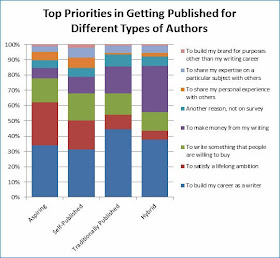Updated 6/7/22
If you write for a niche market, it is not difficult to find a publisher. Unlike large publishers, these houses are always looking for writers - no agent required.
If you write for a niche market, it is not difficult to find a publisher. Unlike large publishers, these houses are always looking for writers - no agent required.
Here are three specialty publishers that accept manuscripts directly from authors. (Make sure you read their guidelines carefully. If you don't follow them your submission will be rejected.)
Note: You can find over 100 publishers accepting unagented manuscripts here: Publishers Accepting Unagented Manuscripts
____________________
Mission Statement: It is our mission to publish and distribute quality, nonfiction books for adult readers seeking practical information to improve themselves in careers, college, finance, parenting, retirement, spirituality, and other related topics. We strive to deliver well-written, comprehensive books that inform, advise, and educate the reader.
Categories:
- Business
- Career
- Job Search
- HR & Work Place Issues
- College Preparation Small Business/Entrepreneurship
- Motivation/Self-Help
- Management
- Marketing/Sales
- Negotiation
- Study Aids
- Reference
Submission Guidelines: Authors may submit a completed manuscript or a full proposal. Please read the submission policy HERE.
Mission Statement: Our goal is to publish books that help teachers and parents enrich the lives of children from birth through age eight. We strive to make our books useful for teachers at all levels of experience, as well as for parents, caregivers, and anyone interested in working with children. The staff at Gryphon House cares deeply about children and about teaching them appropriately and positively. We also believe that spending time with children is a valuable and fun thing to do. Our books reflect these beliefs.
____________________
Note: Gryphon House does not publish children's books.
Submission Guidelines: Gryphon House prefers to receive a letter of inquiry and/or a proposal, rather than the entire manuscript. That means you don't have to wait until you've completed your book to send it to them. For complete submission guidelines click HERE.
Your proposal should include:
In addition, please describe the book, including the intended audience, why teachers will want to buy it, how it is different from other similar books already published, and what qualifications you possess that make you the appropriate person to write the book. If you have a writing sample that demonstrates that you write clear, compelling prose, please include it with your letter.
- The proposed title
- The purpose of the book
- Table of contents
- Introductory material
- 20-40 sample pages of the actual book
In addition, please describe the book, including the intended audience, why teachers will want to buy it, how it is different from other similar books already published, and what qualifications you possess that make you the appropriate person to write the book. If you have a writing sample that demonstrates that you write clear, compelling prose, please include it with your letter.
____________________
Currently closed to submissions
Submission Guidelines: Ripple Grove accepts submissions by mail and email. Read full guidelines HERE.
Submission period: July 1 - September 30.Only illustrators with a story to tell should submit their manuscript as a PDF.
Submit your story with a cover letter that includes a summary of your story, a brief biography of yourself, and contact information.
Authors do not need to submit illustrations. Please note: if your manuscript is not in the body of the email, your story will not be read.
Please allow 3 months to review your submission. Click HERE for complete submission guidelines.

























.jpg)